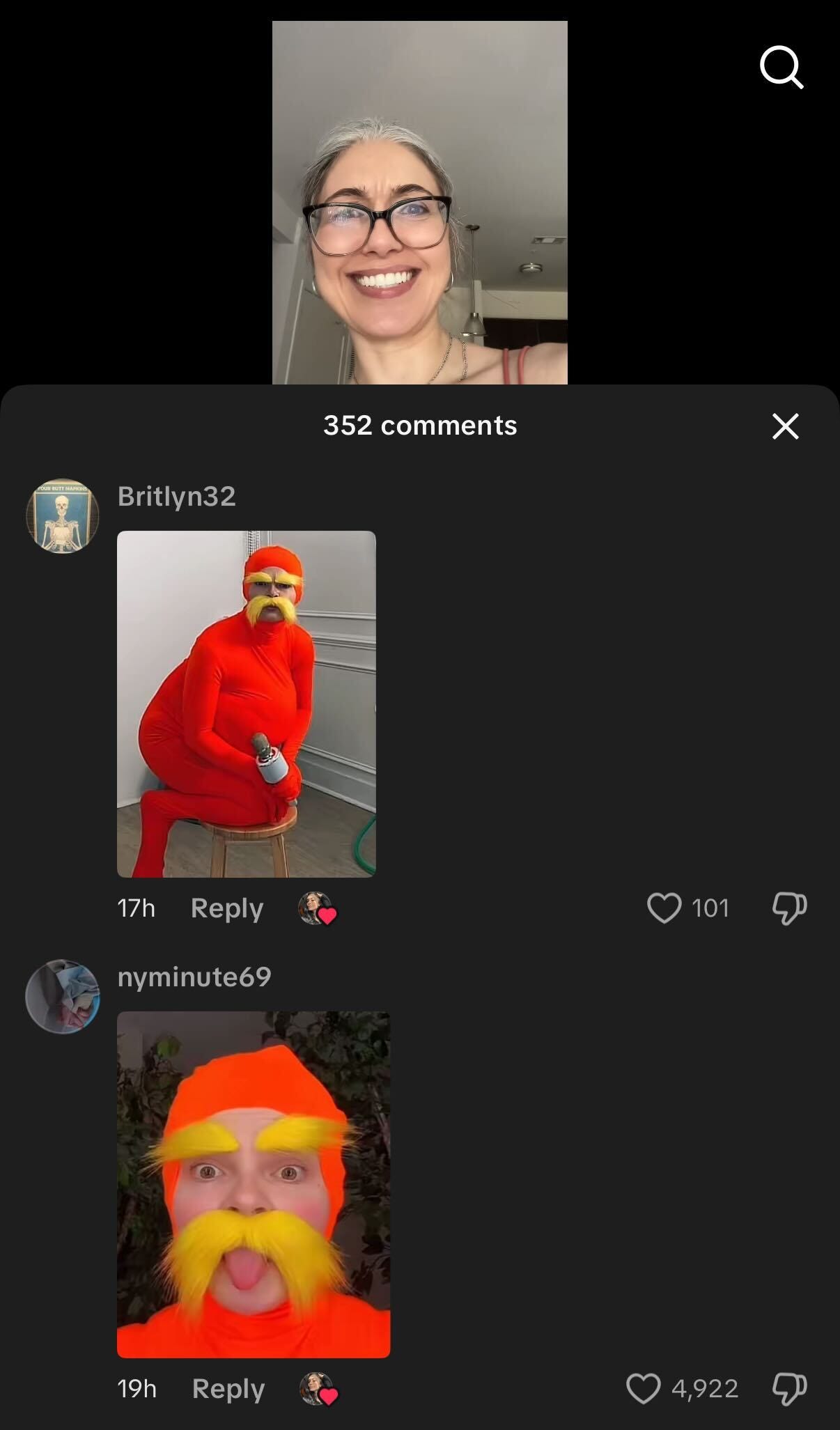On social media we now trade time for numbness
The casino, slop, and touching grass
Every time I open TikTok — which, admittedly, is my first mistake — I can’t stop thinking about how the app introduced photo comments. Overnight the top comments on so many popular videos across the platform became images, largely because the company has deliberately been boosting the feature, and each time I see a series of images used to replace written comments I feel struck anew. If you have no idea what I’m talking about, here’s what it looks like when you check the comments on many a viral TikTok:
This feature isn’t unique to TikTok; on Instagram you can also comment images and gifs, and plenty of people do. On both platforms there was already a remarkable homogeneity in the comment sections — you can find the exact same comments repeated over and over again on video after video. This repetition is now amplified by the endless photo comments repeated again and again across these apps, and taking in this new level of monotonous homogeneity hammered something home in me.
We know that our well-being is diametrically opposed to the endless oligarch accumulation of wealth. We see the rich get richer in direct proportion to the 99% getting poorer. The math is clear there, and the fundamentals of capitalism are on full display. But their power isn’t just contingent on their wealth; that’s the foundation, but more is needed to hold up their increasingly top-heavy structure that is our economy and society. Another vital currency, now more than ever, is our complacency.
It’s easy to say “I AM NOT COMPLACENT,” it’s easy to say we refuse fascism. And it’s increasingly easy and tempting to sit at home while we say it. We were led to believe that in our perfect democracy, elected officials will represent us and will work for us in DC, and if we just clearly express ourselves the levers of government will work out the rest. That illusion, never accurate to begin with, has now collapsed. People are disgusted with both parties, overt fascism is live on the streets of Washington and borne out by masked agents kidnapping people across the country, and every day more people move beyond the feeble idea that properly expressing ourselves is enough to turn the tide.
Simultaneous with an increasingly widespread grasp of the true nature of our situation, namely the fascism of the current regime, is a growing understanding of how capitalism contributes to this clusterfuck we find ourselves in. When a handful of men have as much wealth as the poorer half of America (170 million people), the balance of power is inherently skewed. And when the super-rich became aware that the masses were quickly growing discontent with the massive inequality they benefit from, many eagerly abandoned democracy and embraced the far right, often pivoting in just a handful of years. Musk, Zuckerberg, Bezos and more shifted their public stances practically overnight to align with Trump, both to appease him and to further their own interests.
Right now the interests of these particular men involve propping up the AI boom, which looks more and more like an AI bubble. They’re also deeply interested in dampening the rising tide of leftist sentiment, which looks more and more like a broad base of people at the bottom aiming for those at the top. For Musk and Zuck, social media has become a place to bring these interests together. They doctor our algorithms to feed us right-wing slop and doctor their AI to distract, miseducate, and foster complacence. Instead of human connection they push chatbots, instead of conversation they push argument, and instead of education they push memes and photo comments.
The capitalist paradigm of distraction and complacency comes near its fullest expression in the casino. Countless movies portray the casinos of Europe and Vegas as the height of luxury, sites of intrigue, bastions of sexuality. The reality is that gambling is now conducted largely on smartphones while people sit on couches, or at shitty roadside “casinos” that are just little shoddy buildings attached to gas stations. Instead of luxury or jackpots or adventure people mindlessly hit slot machines and lose money on sports betting and hand their cash over to corporations in dingy, poorly lit rooms. In fact, these rooms are among the most notable innovations of the casino industry. The absence of natural light and clocks and TVs showing the news in gambling halls is deliberate. You’re meant to forget about the world and the passage of time in that black box.
It’s the perfect business, the casino. You give the house money, and although a few people get something in return, it’s all engineered so that the house always wins. Social media increasingly strikes me as a casino, the next industry where we get less and less, and the house always wins. Online we primarily hand over our time rather than our money, but the hours we give over in exchange for so very little may be a resource even more valuable than our cash. We did once receive something in return, some new knowledge or a paradigm shift or connection to wonderful individuals, we did at times receive some real benefit on the old internet. But today we’re increasingly given little more than numbing slop.
This process, this shift at the big social media companies, is often described as enshitification, or the degradation of services and products that takes place when a company focuses more and more on profit extraction and less and less on quality. We’re seeing this take place across many sectors, but the rapidity with which Big Tech has shifted its emphasis in just a matter of years is especially noteworthy, and especially easy for us to identify because of its pace. Facebook, Instagram, Twitter — everyone who’s used the internet this last decade has gotten front row seats to the late-stage capitalism enshitification experience.

Social media has an added dimension now, however. While it was initially thought that the internet overlords benefited from provoking arguments between us (a theory informed largely by Twitter), we’re now seeing a greater emphasis on the bland, the non-controversial, the gently numbing. The biggest platforms, Instagram and TikTok, are filled not with hot takes and controversy, but with generic humor, content that appeals to the widest audiences like silly memes, animals, dances, etc. There is informative content, political content, and healthy discussion on some corners of these apps, but the powers that be increasingly treat you as a passive observer, a scroller rather than a contributor or participant. Your envisioned role is watching endless short videos, giving the house more and more of your time as you seek dopamine and escape.
If you persist in thinking, your behavior may run counter to these aims of our oligarch overlords. The endless scroller must turn their mind off, must consume blankly, must forget about the passage of time as you’re asked to do in the depths of the casino. Instead of comments filled with debate, or even discussion, you can now share images that make you giggle in response to videos that make you giggle. When you’re scrolling and you like a video, the comments you click on are simply more gentle fodder for you to consume. You get to see memes in response to memes, the fun never has to end, and our minds never have to turn on.
The desire to escape is a natural response to this world. The desire for ease and numbness is understandable when things are tough. We can’t snap our fingers and make things better, we can’t immediately create a society we don’t want to escape from. But we also can’t afford endless retreat from reality. We can’t afford to run into the comforting slop these apps on our phones increasingly feed us. We need to get out in the world, we need to touch grass, we need the capacity to wade through conflict and difficulty and tension.
I say this all for myself as much as anyone. I’ve shied away from the messy reality of organizing meetings, hidden from the uncertainty of struggling to make political change, spent hours on my couch buried in my phone that I wish I’d spent out in the world. I desperately want to help build a society that we don’t feel the urge to escape from, that doesn’t prompt the urge to numb out. And I know that the very people who most shape this country and this world are the exact people shaping our algorithms to pacify us and lure us away from challenging the society they’re building. We must refuse them. We must see the traps they lay for us and break free instead of sinking into the ooze they feed us.
Our future depends more and more on this particular escape. Our future depends on finding each other, on building something better together, overcoming the lure of passivity and consumption. So find something you give a shit about, find something that pulls and compels you, find something, some group of people eager to do good whose center of gravity is stronger and more powerful than your phone. They’re out there, the people hoping you’ll join them in transforming this society into one where you no longer crave escape and instead pursue the amazing possibilities that arise when thousands and millions of us work together. So find them, join them, join us, we need you. - JP




I remember comedian Caleb Hearon and many other internet commentators stating from being on our phones so much we all tend to develop the same personalities. This in turn makes it much easier for advertisers to sell us something. We find community and engagement in the things we purchase. We have made it easier for advertisers to commodify our minds.
I've never been on tik tok. No reason to. I rarely go on YouTube unless I'm watching a report or video I've been specifically sent. I delete most emails, unless they concern what I've spent or bought. My contacts on Facebook I skim through, and reply when I feel like it. Mostly authors, political, trade union, or friends. Occasionally someone who made me laugh. I do have contacts on Medium and get news from them, plus JStor and Hyperallergic emails, which I enjoy, (or delete if boring), and for some reason people follow me. Now this I can't explain, as I rarely post except when I share from another's post or an email or news item that I think is worth seeing. I ignore the occasional 'I like your post/description, and I'd like to be your friend' that crop up, as that never works, and I agree with you that what we need is outside gatherings, away from social media or networks on paper or screen, where we can talk face to face, and actually meet up. My grandson visits and is glued to his smartphone, just 16. I'm told that is normal. Unfortunately.
As I'm 77 and not very mobile, travel is difficult. But what you are saying is fact. We have to change before we become subservient completely, and indifferent to our fate.